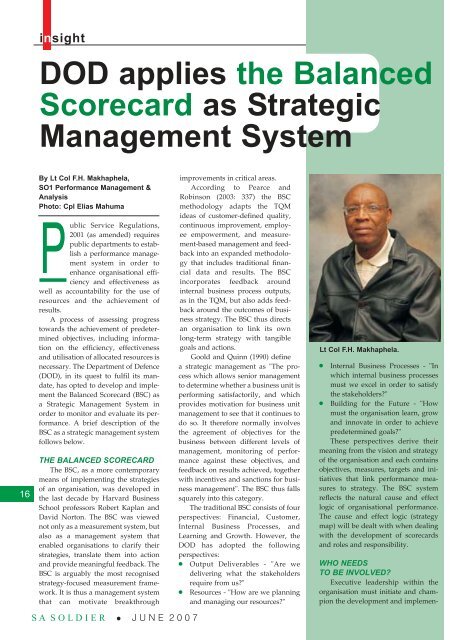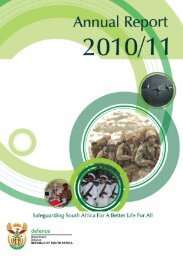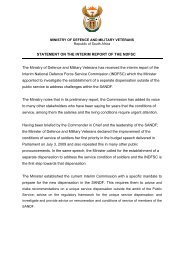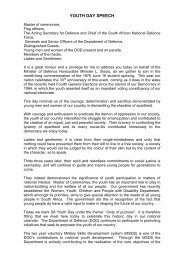JUNE - Department of Defence
JUNE - Department of Defence
JUNE - Department of Defence
Create successful ePaper yourself
Turn your PDF publications into a flip-book with our unique Google optimized e-Paper software.
insight<br />
DOD applies the Balanced<br />
Scorecard as Strategic<br />
Management System<br />
16<br />
By Lt Col F.H. Makhaphela,<br />
SO1 Performance Management &<br />
Analysis<br />
Photo: Cpl Elias Mahuma<br />
Public Service Regulations,<br />
2001 (as amended) requires<br />
public departments to establish<br />
a performance management<br />
system in order to<br />
enhance organisational efficiency<br />
and effectiveness as<br />
well as accountability for the use <strong>of</strong><br />
resources and the achievement <strong>of</strong><br />
results.<br />
A process <strong>of</strong> assessing progress<br />
towards the achievement <strong>of</strong> predetermined<br />
objectives, including information<br />
on the efficiency, effectiveness<br />
and utilisation <strong>of</strong> allocated resources is<br />
necessary. The <strong>Department</strong> <strong>of</strong> <strong>Defence</strong><br />
(DOD), in its quest to fulfil its mandate,<br />
has opted to develop and implement<br />
the Balanced Scorecard (BSC) as<br />
a Strategic Management System in<br />
order to monitor and evaluate its performance.<br />
A brief description <strong>of</strong> the<br />
BSC as a strategic management system<br />
follows below.<br />
THE BALANCED SCORECARD<br />
The BSC, as a more contemporary<br />
means <strong>of</strong> implementing the strategies<br />
<strong>of</strong> an organisation, was developed in<br />
the last decade by Harvard Business<br />
School pr<strong>of</strong>essors Robert Kaplan and<br />
David Norton. The BSC was viewed<br />
not only as a measurement system, but<br />
also as a management system that<br />
enabled organisations to clarify their<br />
strategies, translate them into action<br />
and provide meaningful feedback. The<br />
BSC is arguably the most recognised<br />
strategy-focused measurement framework.<br />
It is thus a management system<br />
that can motivate breakthrough<br />
S A S O L D I E R J U N E 2 0 0 7<br />
WHO NEEDS<br />
TO BE INVOLVED?<br />
Executive leadership within the<br />
organisation must initiate and champion<br />
the development and implemen-<br />
improvements in critical areas.<br />
According to Pearce and<br />
Robinson (2003: 337) the BSC<br />
methodology adapts the TQM<br />
ideas <strong>of</strong> customer-defined quality,<br />
continuous improvement, employee<br />
empowerment, and measurement-based<br />
management and feedback<br />
into an expanded methodology<br />
that includes traditional financial<br />
data and results. The BSC<br />
incorporates feedback around<br />
internal business process outputs,<br />
as in the TQM, but also adds feedback<br />
around the outcomes <strong>of</strong> business<br />
strategy. The BSC thus directs<br />
an organisation to link its own<br />
long-term strategy with tangible<br />
goals and actions.<br />
Goold and Quinn (1990) define<br />
a strategic management as "The process<br />
which allows senior management<br />
to determine whether a business unit is<br />
performing satisfactorily, and which<br />
provides motivation for business unit<br />
management to see that it continues to<br />
do so. It therefore normally involves<br />
the agreement <strong>of</strong> objectives for the<br />
business between different levels <strong>of</strong><br />
management, monitoring <strong>of</strong> performance<br />
against these objectives, and<br />
feedback on results achieved, together<br />
with incentives and sanctions for business<br />
management". The BSC thus falls<br />
squarely into this category.<br />
The traditional BSC consists <strong>of</strong> four<br />
perspectives: Financial, Customer,<br />
Internal Business Processes, and<br />
Learning and Growth. However, the<br />
DOD has adopted the following<br />
perspectives:<br />
Output Deliverables - "Are we<br />
delivering what the stakeholders<br />
require from us?"<br />
Resources - "How are we planning<br />
and managing our resources?"<br />
Lt Col F.H. Makhaphela.<br />
Internal Business Processes - "In<br />
which internal business processes<br />
must we excel in order to satisfy<br />
the stakeholders?"<br />
Building for the Future - "How<br />
must the organisation learn, grow<br />
and innovate in order to achieve<br />
predetermined goals?"<br />
These perspectives derive their<br />
meaning from the vision and strategy<br />
<strong>of</strong> the organisation and each contains<br />
objectives, measures, targets and initiatives<br />
that link performance measures<br />
to strategy. The BSC system<br />
reflects the natural cause and effect<br />
logic <strong>of</strong> organisational performance.<br />
The cause and effect logic (strategy<br />
map) will be dealt with when dealing<br />
with the development <strong>of</strong> scorecards<br />
and roles and responsibility.

















